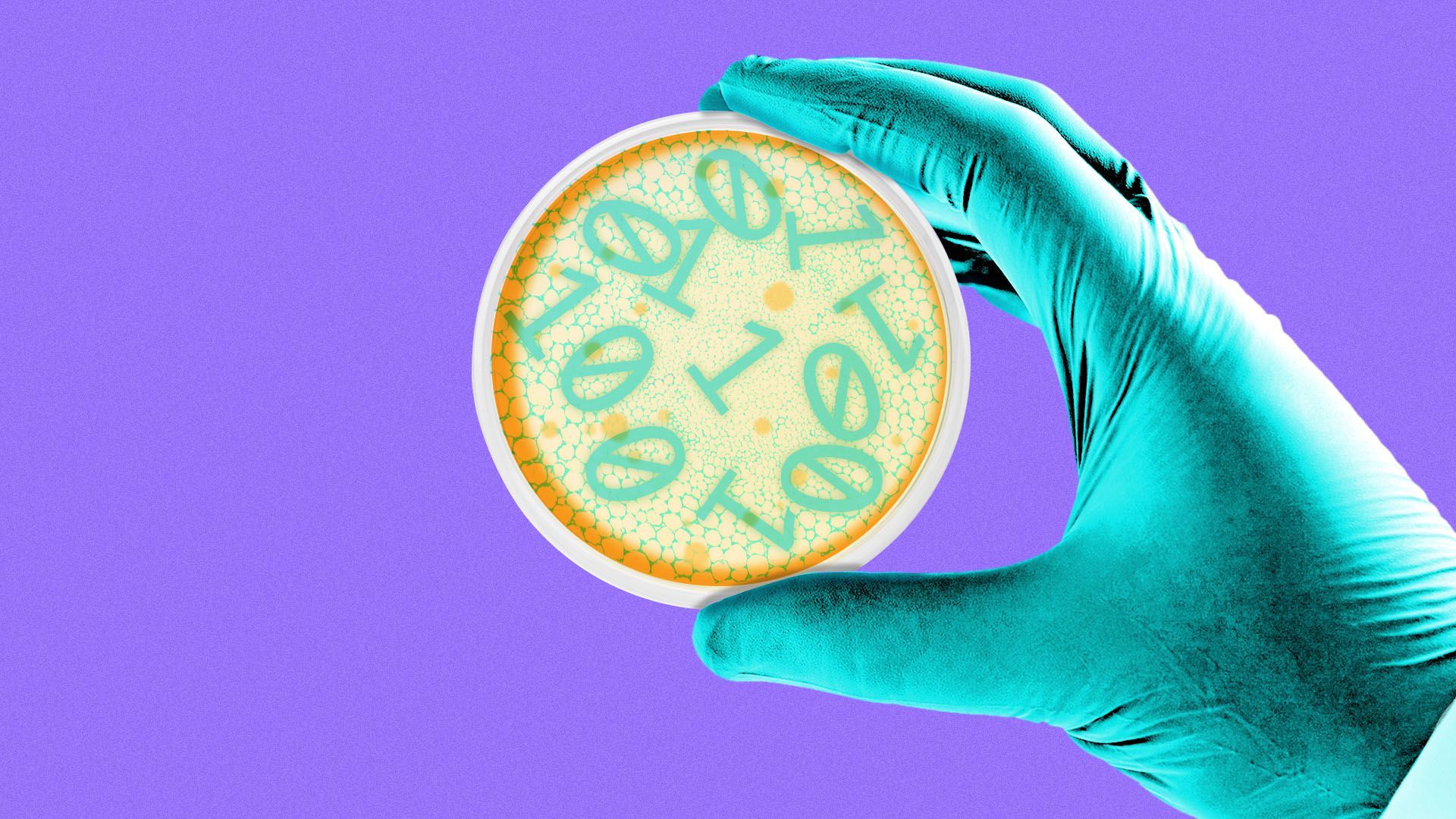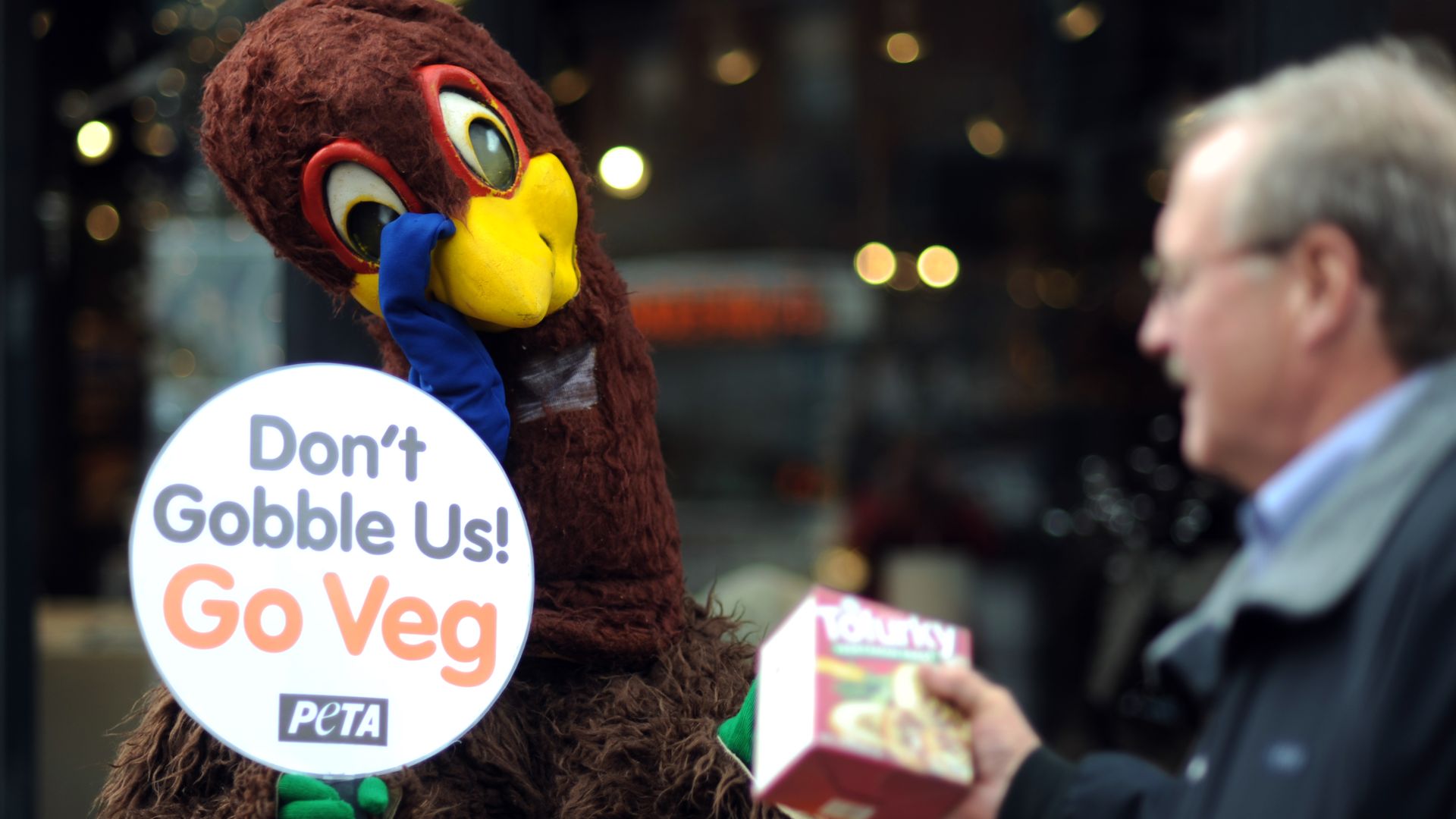| | | | | | | Presented By ForgeRock | | | | Axios Future | | By Bryan Walsh ·Nov 24, 2021 | | Welcome to Axios Future, where I'm thankful for all of my subscribers, including the one who didn't like the James Bond piece. Today's Smart Brevity count: 1,451 words or about 5½ minutes. | | | | | | 1 big thing: Why more Americans are going childless |  | | | Illustration: Sarah Grillo/Axios | | | | A Pew survey late last week found that 44% of Americans between 18 and 49 who aren't parents say it is not too likely or not at all likely that they will have children. - That's an increase of 7 percentage points from 2018.
Why it matters: The shift could lead to smaller family Thanksgiving dinners and major social and economic changes, as children become rarer in many parts of the country and more American adults reach old age with little to no family to support them. By the numbers: The effect of greater childlessness is being felt in U.S. fertility numbers, which were already at a record low before 2020 and have continued to drop during the pandemic. - "[T]he main cause of declining fertility in America is increasing childlessness at all ages" rather than declining second or third births, writes Lyman Stone, a research fellow at the Institute for Family Studies (IFS).
- More adults are reaching retirement age without children, and increasingly without a partner.
- Data released by the Census Bureau this year found that 19.6% of Americans between 55 and 64 reported being childless, compared to 15.9% of those 65–74 and 10.9% of those over 75.
The big picture: Most of those in the Pew survey who report they're unlikely to have kids say the reason is that they just don't want to have children. But Americans, in general, have also become more interested in smaller families. - Data from Gallup polls find that Americans' ideal number of kids has fallen from around 3.5 in the 1930s to 2.5 today. And that's still well above the current actual level of 1.7 lifetime births per woman.
- Fears about the environment, supposed overpopulation and the general state of the world have been getting a lot of press.
- Yes, but: Just 5% of expected non-parents in the Pew survey cited environmental reasons, a figure that is largely unchanged from earlier surveys.
What they're saying: Much of the increase in childlessness is a result of what Stone calls "stage of life reasons," including declining rates of marriage and coupling. - Another factor is the perception among many Americans that modern parenting is particularly time- and labor-intensive, which means that choosing to have children means forgoing leisure and work.
What to watch: There's a growing political and cultural division in the U.S. over family size. - While religious Americans have long tended to get married earlier and have more children than secular Americans, the differences were much smaller in the 1970s and '80s than since 2000.
The bottom line: Whether it's right to bring a child into the world is an individual decision, but one that is highly influenced by changing social attitudes — in either direction. Read the rest. |     | | | | | | 2. How to program biology like a computer |  | | | Illustration: Sarah Grillo/Axios | | | | The growing synthetic biology industry is developing tools to allow companies to program living cells the way we program computers. Why it matters: Turning cellular engineering from an art to an industry could open the door to more sustainable energy, food and materials, but it carries the risk of making it much easier to create the biological equivalent of malware. What's happening: Earlier this month, the leading synthetic biology company Ginkgo Bioworks launched a Cell Development Kit (CDK) service for companies that want easy access to its biological engineering services. - Like much in the synthetic biology world, the name is directly taken from the computer world — tech companies have long offered software development kits that make it easier for people to build and test computer programs.
How it works: Biological engineering has long been slow and laborious — think rows of postgraduate students pipetting liquids by hand in a lab. But Ginkgo says its CDKs will streamline the process. - A customer like Motif FoodWorks — a Boston-based startup that makes ingredients for plant-based meat and dairy — can use a CDK to have Gingko rapidly engineer the necessary microbes in its automated biological foundry.
- "They can focus on product development rather than hiring a bunch of biologists to build DNA by hand," which helps them get to market faster, says Patrick Boyle, the head of codebase at Ginkgo.
The catch: Should the company's approach become successful, it will come with biosecurity risks. Drew Endy, a bioengineer at Stanford University, told the NY Times we should assume that in the near future, "anyone, anywhere can make any virus from scratch." - Yes, but: Boyle says Ginkgo is building biosecurity into its platform, in part by using automated tools that can scan synthesized DNA orders for potentially dangerous strains.
Read the rest. |     | | | | | | 3. Meet the robots that will help pick your Black Friday orders | Nimble Robotics machines picking goods at an e-commerce warehouse. Credit: Nimble RoboticsAs more of our goods and gifts are being purchased online, robots are set to play a bigger role in e-commerce warehouses. Why it matters: With retailers struggling to meet the demand for workers in a tight labor market, smarter robots that can adapt to the often chaotic conditions of a warehouse could help close the gap. When you place an online order this holiday season, it will need to be fulfilled by a retailer, which means that good has to be physically picked and packed at a warehouse. - It's usually been humans doing the work — as of August, nearly 150,000 more people were employed in e-commerce warehouses than before the pandemic.
Yes, but: Retailers — especially brick-and-mortar companies that are moving increasing amounts of their business to e-commerce — are having trouble finding enough workers, opening the door to automation. How it works: Nimble Robotics is using computer vision-enabled AI — and human helpers — to train robots to pick and pack a wide variety of e-commerce goods. - "We use an algorithm called imitation learning, where you use a human to remotely operate a robot to accomplish a certain task," says Simon Kalouche, Nimble's founder and CEO.
- "If you do this hundreds or thousands of times over various tasks, you can train a neural network to say, 'I've seen this and I know how to pick it up.'"
Read the rest. |     | | | | | | A message from ForgeRock | | Enterprise grade identity at internet scale | | |  | | | | ForgeRock delivers what enterprises need to provide safe and seamless experiences to engage customers and keep employees productive to grow their businesses. What this means: The company's software can be a game changer for your access management strategy. See how ForgeRock can help you. | | | | | | 4. NASA probe launches on mission to redirect an asteroid |  | | | Photo: NASA | | | | A NASA spacecraft called DART — short for Double Asteroid Redirection Test — launched early Wednesday morning on a journey to change the orbit of an asteroid in deep space, writes Axios Space author Miriam Kramer. Why it matters: The mission is designed to test technology that could one day be used to change the course of a dangerous asteroid if one is ever found on a collision course with Earth. How it works: DART is now on its way to its target — a small asteroid "moonlet" called Dimorphos in orbit around a larger asteroid called Didymos. - The two asteroids aren't in danger of impacting Earth, but this mission will test whether the technology can shift the orbit of an asteroid just slightly to throw it off course.
- DART is expected to slam into Dimorphos in fall 2022.
Read the rest. |     | | | | | | 5. Worthy of your time | | How green activists mislead and hold back progress (Ted Nordhaus — Economist) - An "eco-modernist" makes the case that climate activists are inadvertently hurting their own cause.
Is therapy the best way to make the world happier? (Dylan Matthews — Future Perfect) - While global philanthropy has mostly focused on fighting disease and poverty, mental wellness is emerging as a new target.
Is China's catch-up growth over? (Noah Smith) - China's growth is impressive and its overall economy is huge, but it will likely never match the U.S. on a per capita level.
Creating dangerous viruses in the lab is a bad way to guard against future pandemics (Laura Kahn — Bulletin of the Atomic Scientists) - Whether SARS-CoV-2 came from a lab or not, engineering lethal new viruses creates more danger than it prevents.
|     | | | | | | 6. 1 Thanksgiving thing: The financial benefits of a Tofurky dinner |  | | | Of course a turkey would say that. Photo: Hyoung Chang/The Denver Post via Getty Images | | | | A soybean-based Thanksgiving dinner would cost nearly three times less per pound and provide almost twice as much protein as a turkey-based one. Why it matters: If you want to maximize your budget on Thanksgiving — as well as the lifespan of turkeys — soybean-based Tofurky may be the way to go. By the numbers: The Federal Reserve Bank of St. Louis calculated that between 1990 and now, the average global price of turkey has been six times higher than the price of soybeans. - As of the third quarter of 2021, a Thanksgiving dinner serving of turkey cost $1.42, while a Tofurky dinner with the same number of calories would cost $0.66.
The catch: Beyond the, uh, taste differentials, your Tofurky Thanksgiving meal will be almost three times larger by weight because roasted turkey has almost three times the caloric value of an equivalent serving of roasted tofu. - That would "either keep you at the dinner table longer or provide you with more leftovers," the bank writes in a blog post.
The bottom line: Unless you're a hardcore vegan, maybe keep any Fed economists far away from your Thanksgiving dinner tomorrow. |     | | | | | | A message from ForgeRock | | Enterprise grade identity at internet scale | | |  | | | | ForgeRock delivers what enterprises need to provide safe and seamless experiences to engage customers and keep employees productive to grow their businesses. What this means: The company's software can be a game changer for your access management strategy. See how ForgeRock can help you. | | |  | | It'll help you deliver employee communications more effectively. | | | | | | Axios thanks our partners for supporting our newsletters. If you're interested in advertising, learn more here.
Sponsorship has no influence on editorial content. Axios, 3100 Clarendon Blvd, Suite 1300, Arlington VA 22201 | | | You received this email because you signed up for newsletters from Axios.
Change your preferences or unsubscribe here. | | | Was this email forwarded to you?
Sign up now to get Axios in your inbox. | | | | Follow Axios on social media:    | | | | | |









No comments:
Post a Comment